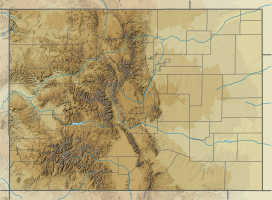Thunder Mountain (Colorado)
 From Wikipedia the free encyclopedia
From Wikipedia the free encyclopedia
| Thunder Mountain | |
|---|---|
 South aspect | |
| Highest point | |
| Elevation | 13,108 ft (3,995 m)[1] |
| Prominence | 171 ft (52 m)[2] |
| Parent peak | Greylock Mountain (13,575 ft)[2] |
| Isolation | 1.0 mi (1.6 km)[2] |
| Coordinates | 37°36′17″N 107°33′38″W / 37.6047670°N 107.5604969°W[3] |
| Geography | |
| Country | United States |
| State | Colorado |
| County | La Plata County |
| Protected area | Weminuche Wilderness |
| Parent range | Rocky Mountains San Juan Mountains Needle Mountains[1] |
| Topo map | USGS Columbine Pass |
| Climbing | |
| Easiest route | class 2+ scrambling[2] |
Thunder Mountain is a 13,108-foot (3,995 m) summit in La Plata County, Colorado, United States.
Description[edit]
Thunder Mountain is situated in the Needle Mountains which are a subrange of the San Juan Mountains. The mountain is located 30 miles (48 km) northeast of the community of Durango and set within the Weminuche Wilderness on land managed by San Juan National Forest. Precipitation runoff from the mountain's slopes drains into Vallecito Creek which is a tributary of the Los Pinos River. Topographic relief is significant as the summit rises 3,800 feet (1,158 m) above the creek in 1 mile (1.6 km). The mountain's toponym has been officially adopted by the United States Board on Geographic Names,[3] and has been recorded in publications since at least 1906.[4]
Climate[edit]
According to the Köppen climate classification system, Thunder Mountain is located in an alpine subarctic climate zone with cold, snowy winters, and cool to warm summers.[5] Due to its altitude, it receives precipitation all year, as snow in winter, and as thunderstorms in summer, with a dry period in late spring.
See also[edit]
References[edit]
- ^ a b "Thunder Mountain, Colorado". Peakbagger.com. Retrieved April 9, 2023.
- ^ a b c d "Thunder Mountain - 13,108' CO". listsofjohn.com. Retrieved April 9, 2023.
- ^ a b "Thunder Mountain". Geographic Names Information System. United States Geological Survey, United States Department of the Interior. Retrieved April 9, 2023.
- ^ Henry Gannett, United States Geological Survey (1906), A Gazetteer of Colorado, US Government Printing Office, p. 168.
- ^ Peel, M. C.; Finlayson, B. L.; McMahon, T. A. (2007). "Updated world map of the Köppen−Geiger climate classification". Hydrol. Earth Syst. Sci. 11. ISSN 1027-5606.

